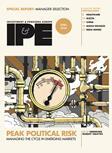The European Commission has indicated it is unlikely to apply Solvency II-type rules to pension funds, despite continuing pressure from insurance companies and regulatory authorities. EC officials acknowledge pensions funds are already facing heightened capital and asset allocation requirement. New requirements could lead to the closure of defined benefit pension schemes.
Charley McCreevy, commissioner for internal markets and services, said in an address in London that, although the Committee of European Insurance and Occupational Pensions Supervisors (CEIOPS) is looking at solvency rules on pension funds; he believes he might apply Solvency II rules to occupational pension funds if there is a good case for doing so.
"I believe that further work is needed before we can commit ourselves to any specific regime," he said. "Stakeholders will have an opportunity to provide us with their views. But a strong business case would be required before we start shifting Solvency II rules to pension funds, and frankly, I would be surprised if there is such a case. I have no intention of sponsoring proposals that would risk closing down defined benefit pension schemes."
CEIOPS is in the process of assessing where existing solvency rules - including those within the directive on Institutions for Occupational Retirement Provision (IORP) - affect pension funds and whether tighter requirements are needed. However, it appears to be a political, rather than regulatory decision.
Harald Gössl of the Pensionskassen department at the Austrian financial supervisor FMA, told delegates at a conference in February there are "no technical arguments" against requiring pension funds to meet the same Solvency II rules as insurance companies, adding: "There is no reason why similar pension vehicles should not be treated equally when it comes to supervision."
He suggested Karel van Hulle from the EC's department for insurance and pensions, and Thomas Steffen, head of the German supervisory body BaFin, are of the same opinion, but this does run in competition with that of the EC's internal markets DG.
"It might even be that for political reasons it is eventually decided that pension vehicles are not similar enough to come under one supervision directive," Gössl suggested. But he said the working group of CEIOPS noted regulators will first wait to see how Solvency II affects insurers before considering if it should be applied to pension funds.
"One of the problems is how to compare different models for stress-testing pension funds - or whether they are at all comparable," he explained.
As pension funds already face so much increased pressure elsewhere on tightened solvency - through proposals from the Accounting Standards Board, the UK's Pensions Regulator and heightened scrutiny of the Netherlands' DNB's because of recent investment market turbulence - McCreevy's speech was welcomed by bodies representing pension funds because it indicated they could be granted a reprieve from further EU rules.
"There is no sense of problems either in domestic and cross-border pensions," said Nigel Peaple, director of policy at the UK's National Association of Pensions Funds (NAPF). "Pension schemes operate very differently in each country so a one-size-fits-all arrangement is not feasible. And insurance company pensions are not the same thing, they operate on different principles. Whereas the insurance company money must be available to pay out, with a company pension scheme you also have the sponsoring employer if there are any funding issues. So this development is very encouraging."
Chris Verhaegen, secretary general of the European Federation for Retirement Provision (EFRP), said she hopes McCreevy will continue to be in favour of pension funds, particularly as schemes in the UK and Ireland would be hardest hit by any increased capital requirement.
"We are very pleased that the Commissioner has repeated the message he delivered in Frankfurt in November at the CEIOPS conference and we are very pleased he is continuing on this plan. We don't see much happening on the field and hope the Commissioner will remain firm," said Verhaegen. "We are also very pleased he recognises there is a danger pension schemes will be hurt and employers will be no longer willing to offer them if Solvency II is also applied to pension funds. "












No comments yet